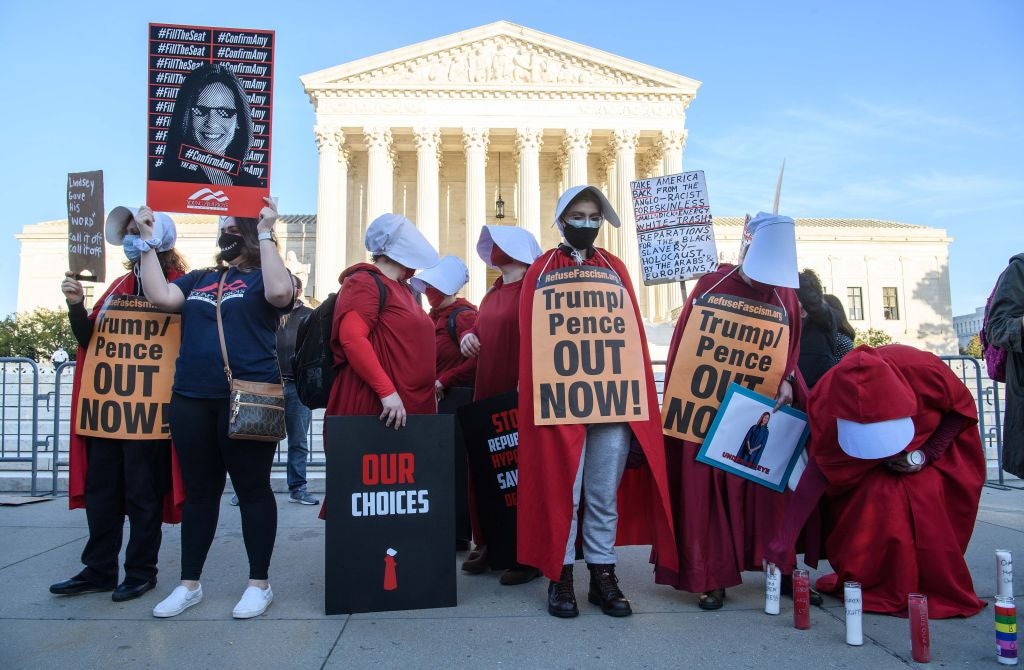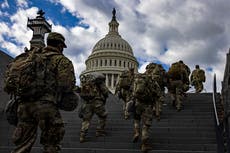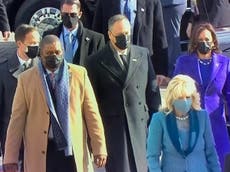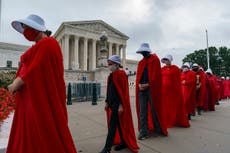Now Trump has gone, let’s stop comparing politics to popular culture like 1984 and The Handmaid’s Tale
Hiding behind literature and fantasy stops us dealing with the real problems


Your support helps us to tell the story
From reproductive rights to climate change to Big Tech, The Independent is on the ground when the story is developing. Whether it's investigating the financials of Elon Musk's pro-Trump PAC or producing our latest documentary, 'The A Word', which shines a light on the American women fighting for reproductive rights, we know how important it is to parse out the facts from the messaging.
At such a critical moment in US history, we need reporters on the ground. Your donation allows us to keep sending journalists to speak to both sides of the story.
The Independent is trusted by Americans across the entire political spectrum. And unlike many other quality news outlets, we choose not to lock Americans out of our reporting and analysis with paywalls. We believe quality journalism should be available to everyone, paid for by those who can afford it.
Your support makes all the difference.Donald Trump’s tangerine face, angry Tweets and disinfectant coronavirus remedies may be stranger than fiction. But now the 45th president has left the Oval Office, the time for us to compare dystopian literature with politics has got to go too.
In a habit that’s become a staple of Trump’s administration, the appalling scenes in the Capitol were quickly attributed to Margaret Atwood's novel The Handmaid’s Tale. Washington DC was one of the first places to “fall” to Gilead’s patriarchal and evangelical rule in the book.
For the past four years, US citizens, especially the centre-left, have taken to blurring life with fiction in order to avoid confronting their disturbing reality.
The outgoing administration was defined by “fake news” and “alternative facts”, with many comparing it to George Orwell’s dystopian novel 1984. Two weeks into Trump’s presidency, sales of the novel surged by 9,500 per cent, and now his time in office has ended, sales are rising once again. The term “Orwellian” has become a buzzword in anti-Trump thinkpieces, and Trump himself has appropriated this metaphor: convincing supporters that his election loss was due to voter fraud.
The fact that Trump adopted these analogies, making him the personification of dystopia, means the significance of these navel-gazing comparisons is long gone. Fiction has become reality.
Although 1984 and Handmaid's Tale don't end well, they still feed into the American Dream – after all, if you can imagine a dystopia you can imagine a utopia. So, America’s penchant for a pop-culture metaphor correlates to the country’s obsession with happy endings. Observing politics through fantasy or literature is a form of escapism instead of accepting the unpalatable truth – that things might not be alright in the end. It is also counterintuitive and prevents change.
For some, the only thing standing between them and the American Dream is Trump. All they need to do is oust the “bad guy” and then they will live the rest of their lives in bliss. The reality is a lot more complex. Issues like gun control, institutional racism and inaccessible healthcare were entrenched in the nation long before Trump was president, and they’ll continue to be a problem long after he is gone, too.
It appears that those who analogize are in denial of how deep the issues in their country run. But, by viewing America through the lens of a fantastical narrative, they can bury their heads in the sand. Unfortunately, not everyone has the luxury of being able to live in denial of these issues. The most vulnerable groups in society like schoolchildren, those from lower socioeconomic backgrounds and Black Americans will be the ones bearing the brunt of the country’s institutional faults.
Those who have never suffered as a result of these issues, can’t conceive of their existence. After all, if they do, it risks shattering the carefully constructed illusion. It isn’t so much the fact that these people can’t engage with the reality of America’s inherent flaws and impact on the less fortunate – it is more so the fact that they simply don’t want to. While yesterday’s inauguration was a day of hope and jubilance for many, what people need to realise is that Trump being gone isn’t the end of the story. Unless this new administration takes practical steps to fix issues like the disparity gap and educational inequality, then the “evil” that people are so sure flew away in the Marine helicopter before the inauguration on Wednesday may still be present after all.
Four people died as a result of the incident at the Capitol. The protest was messy, vicious, and indicative of a terrifyingly unstable future within the supposed “Land of the Free”. With America on the verge of a constitutional crisis, no good can come from comparing it to fiction. If the American people truly want good to happen, then they need to move away from fiction, the happy endings of literature and the sentiments of the star-spangled banner. They need to start facing reality.
Ultimately, there’s a fine line between contextualising the world through stories and retreating into them completely. Fetishizing America’s systematic trauma will not make it great again. That can only be achieved by directly confronting reality, no matter how dark and uncertain it may be.



Join our commenting forum
Join thought-provoking conversations, follow other Independent readers and see their replies
Comments